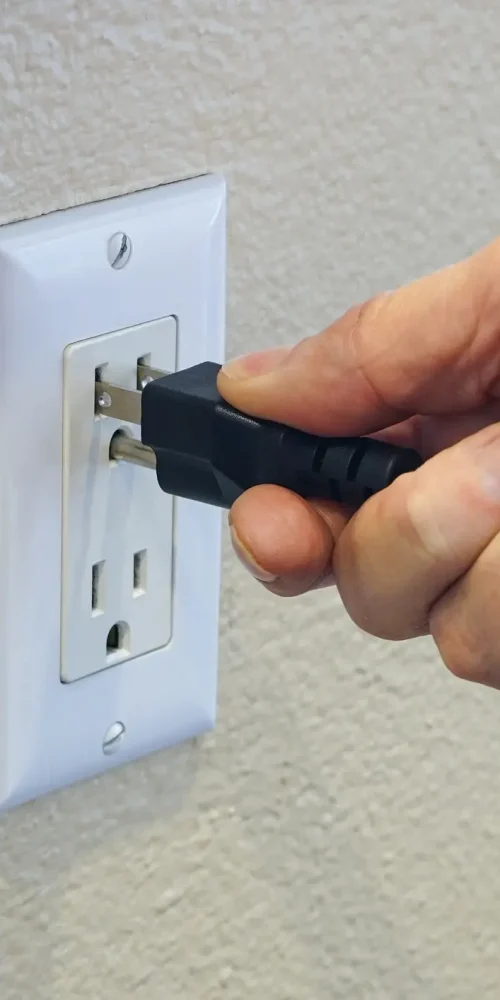Tips for Electrical Safety & Maintenance: Faulty Wiring, Electrical Fires, and Tripped Circuit Breakers
May 21, 2025
When it comes to your home’s electrical system, what you can’t see can absolutely hurt you. Outdated wiring, overloaded circuits, or loose connections—hiding behind your walls—could be creating risks for electrical fires, damaged electronics, or even shock.
That’s why we’ve assembled answers to the most common questions we hear from homeowners:
- What are the warning signs of faulty wiring?
- How can I prevent electrical fires in an older home?
- Why does my circuit breaker keep tripping?
- Is it safe to reset a tripped circuit breaker?
- Should I upgrade my electrical panel?
Plus, find expert advice on when to DIY and when to call in a licensed electrician.
Let’s get started.
What are the Warning Signs of Faulty Wiring?
Faulty wiring is one of the top causes of house fires, and it’s more common than you think. Keep and eye out for these red flags:
- Flickering or dimming lights, especially when appliances turn on
- Buzzing or sizzling sounds from outlets or walls
- Burning smells, particularly around outlets or your breaker panel
- Warm, vibrating, or discolored outlets or switches
- Frequent breaker trips or blown fuses
- Loose, sparking, or non-functioning outlets
If you notice any of these signs, don’t ignore them—and don’t attempt to DIY. Faulty wiring can be dangerous and is a job for a licensed electrician.
How Can I Prevent Electrical Fires in an Older Home?
Homes built before the 1980s weren’t designed to handle today’s electrical demands. Preventing electrical fires means being proactive.
- Schedule an electrical safety inspection to check for outdated or unsafe wiring.
- Don’t overload circuits by plugging too many devices into one outlet.
- Skip the extension cords as permanent solutions. They are a temporary fix at best—if you need more outlets in different locations, an electrician can install them.
- Replace two-prong outlets with grounded three-prong outlets—but verify that grounding actually exists behind the wall.
- Upgrade your electrical panel if it’s outdated or undersized.
- Install GFCI outlets (ground fault circuit interrupters) for extra protection against electrical shock in kitchens, bathrooms, garages, and basements.
If your home still has a fuse box, it’s probably time to consider a panel upgrade.
Why Does My Circuit Breaker Keep Tripping?
This is one of the most common service call reasons we get. It’s frustrating, we know. But when a breaker trips, it’s doing its job: shutting off power to prevent overheating and fire.
Some of the most common causes include:
- Overloaded circuits—common in kitchens and home offices with too many devices
- A damaged appliance or power strip
- Faulty wiring that is loose or frayed
- Moisture near outlets, especially in basements or garages
- An outdated electrical panel
If the same breaker keeps tripping, don’t just reset it and hope for the best. A worn-out breaker is a safety issue—call an electrician for an inspection.
Is It Safe to Reset a Tripped Circuit Breaker?
In most cases, yes. Here’s how to reset it:
- Find the breaker that’s flipped to the middle or OFF position.
- Push it firmly to OFF, then back to ON.
If the breaker stays on, you’re probably in the clear. But if that same breaker keeps flipping? That’s not something you want to ignore.
Repeated tripping could mean a faulty breaker, unsafe wiring, or a bigger underlying issue. Don’t take chances—call in the pros.
Should I Upgrade My Electrical Panel?
It depends. If your home still has a 100-amp panel, or if your panel is over 25 years old, it might be time. A modern home should have at least a 200-amp panel to handle the demands of HVAC systems, home offices, kitchen appliances, EV chargers, and home additions or remodels.
You should consider upgrading your electrical panel if:
- You hear buzzing near your panel
- Your lights dim when appliances turn on
- You’re experiencing frequent tripped breakers
- You plan to renovate or sell your home
Still unsure? That’s where an electrician can help.
Bottom Line: Electrical Safety Isn’t Optional
If something in your home’s electrical system seems off, it probably is. Don’t ignore the signs. Electrical safety isn’t something to gamble with.
WIREONE’s licensed electricians are here to help central Iowa homeowners stay safe—with fast service and no guesswork.
Protect your home. Book your residential electrical safety inspection today.
 What to Do If Your Outlets Aren’t Working (But the Breaker Didn’t Trip)
What to Do If Your Outlets Aren’t Working (But the Breaker Didn’t Trip)
What to Do If Your Outlets Aren’t Working (But the Breaker Didn’t Trip)
 Why Do My Lights Keep Flickering? (And How to Fix It)
Why Do My Lights Keep Flickering? (And How to Fix It)
Why Do My Lights Keep Flickering? (And How to Fix It)
 Four Upgrades to Make Your Home More Energy Efficient
Four Upgrades to Make Your Home More Energy Efficient


